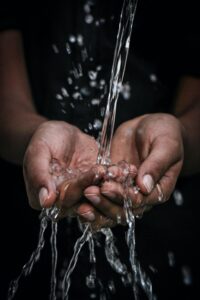How far do you walk to wash your hands? For many people around the world, hauling water home from miles away is part of their daily routine. In rural Africa, for example, the average woman walks more than three miles per day to bring 40 pounds of water home.
 Throughout the COVID-19 pandemic, health experts have promoted hand washing and general hygiene as the primary means of protection against the virus. For those without clean running water, staying healthy has become a greater challenge than before.
Throughout the COVID-19 pandemic, health experts have promoted hand washing and general hygiene as the primary means of protection against the virus. For those without clean running water, staying healthy has become a greater challenge than before.
World Water Day, observed annually on March 22, aims to promote conversations about the importance of water and advocate for the protection of this vital resource. Each year, this United Nations international day focuses on a specific theme. The theme for World Water Day 2021 is “valuing water.”
Water plays many roles in our lives, such as for drinking, cooking, growing food, and washing. Still, the price of water restricts the quantity and quality available in many communities. The goal of this year’s theme is to understand the economical, social, and cultural value people place on water.
A Threat of Climate Change
Random Acts Regional Representative Zahra Khan Durrani lives in Pakistan, one of many countries experiencing a major water crisis. Pakistan’s growing population and urbanization has led to an increase in demand for water, while the supply remains limited and erratic.
Pakistan is not the only place with these concerns. A dozen countries in North Africa and the Middle East rank among the top 17 countries with the highest rate of water shortages. This region also has generally hot temperatures, which can lead to drought and heat waves that naturally decrease water availability.
Climate change escalates these problems. Recent increases in extreme weather events have led to food shortages and entire households relocating. Heightened frequencies of heat waves, droughts, and floods increase the risk of hunger, poverty, and conflict.
The Water Crisis Does Not Discriminate
As an essential resource for the socio-economic development of nations, water is necessary for food production, energy generation, and healthy ecosystems. This means that poorer countries with less access to resources, such as desalination plants that convert saltwater to freshwater or facilities that store freshwater, tend to experience higher water scarcity.
But wealthier countries are not excluded from the water crisis. In the southwestern United States, for instance, one in three Navajo families do not have a sink or toilet. The government signed treaties with the Navajo and other native tribes more than 150 years ago. The tribes gave up their land in exchange for funding of housing, infrastructure, and healthcare, which they have yet to receive.
The Navajo Water Project, an indigenous-led organization, serves to bring clean running water to families in New Mexico, Utah, and Arizona. This group is not alone in working to combat the global water crisis.
Getting involved with charities and organizations in affected regions is one of many ways we can make a difference. Zahra recommends becoming an advocate for climate change and access to water.
“Our collective effort should be on making ourselves, and those polluting the environment and contributing the most to climate change, accountable for their actions,” said Zahra.
“Raising awareness is the least that people can do. And just because these challenges may not affect someone directly, water scarcity is a reality for so many people,” Zahra continued. “Shortage of water is not a standalone challenge. It is a vital economic and social resource.”
